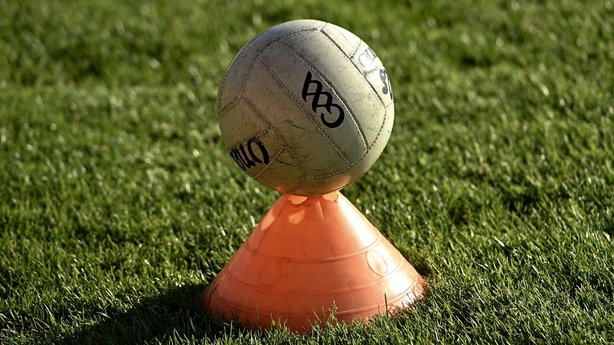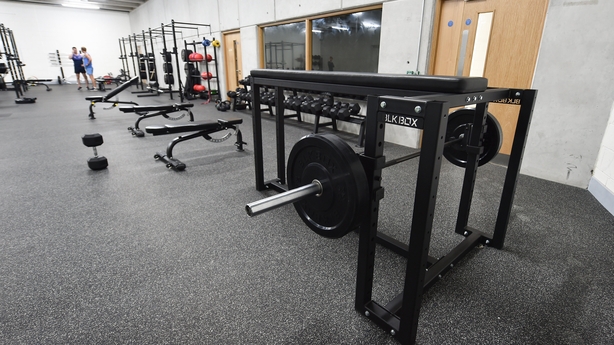Back in the good old days of inter-county football, training was every Tuesday and Thursday night with a match on Sunday. Weight training consisted of hauling bales of hay or breeze blocks you threw around all week on the farm or on the building site.
Recovery was a bag of Tayto, bottle of Cidona and a Cadburys wafer snack bar on the way home from training. Then when you got home a cup of tea and half a box of Kimberly's and half a box of Mikados.
Once you got word the following weekend was off from playing a match you were organising a weekend away in Salthill or Tralee, and the chances of anyone training during the non-match week was very remote.
How different this picture will look for every inter-county team next week. After round five of the Allianz League has finished up strength and conditioning coaches were licking their lips in anticipation.
We need your consent to load this rte-player contentWe use rte-player to manage extra content that can set cookies on your device and collect data about your activity. Please review their details and accept them to load the content.Manage Preferences
They were thinking of the amount of physical training they can expose the player to in the 13-14 days until round six commences.
This mindset is also applied to the various coaches. They also would have identified aspects of the tactical and technical side of the preparation so far that needs development and certain tweaks based on how the performances have been thus far.
How the downtime between round five and six of the league is managed will go a long way in determining how the players perform in the next couple of games. If the training is too hard and the players do too much they are exposed to a high risk of fatigue or injury, which inevitably is more than likely going to lead to defeats in the games.
If a team reports five or six hamstring injuries or two to three groin injuries during this time, the alarm bells should be ringing for all concerned. If the physical and tactical training is delivered by the coach and the strength and conditioning coach is at the appropriate level and intensity, there could be huge benefits going into the next stage of the league.
How this period would look could vary from team to team, but most of the top teams would have a schedule along the following lines.
Sunday
Round 5 of Allianz League
Monday
On a recovery day players will go for a 20-minute swim followed by a stretch, a massage or they will use a foam roller to loosen out all the muscles that worked so hard during the previous day's game.
Some players will need immediate physio treatments depending on what type of knock or muscle injury they may have picked up in the game. Some teams organise a group yoga or stretching class to help the recovery process.

Tuesday
AM: Early morning weight session. At this stage it is still less than 48 hours since most players have completed a high-intensity match. The weights should be mainly focused on the upper body area and use a fairly light load which will also help aid recovery.
PM: Team Pitch Session. Warm-up of 15-20 minutes will include some light running and skills with the ball. The purpose of the warm-up is to slowly increase the temperature of the muscles and the body so the intensity will increase towards the end of this unit.
Then 40-45 minutes of football related activities, which includes a lot of hard running, kick passing, tackling and shooting. This should mimic a lot of runs, tackles, passes and shots that take place in a match.
Top-ups: The last 10-15 minutes of the session could involve the players doing some interval type running training. This could be along the lines of 10 x 40-metre sprints under seven seconds with a recovery time of anything from 13-23 seconds. Normally 2-3 sets of this will be completed.
Wednesday
Optional training will take the form of players doing individualised sessions. This is important. A one size fits all approach does not take into consideration the individual and their status.
Individual training may be along the lines of rehabilitation for any niggles or weaknesses. Sessions may involve strengthening some of the smaller muscles of the body to help prevent future injuries, for example in the calf, groin, hamstring, and other areas.
Some players will be able to do a heavy gym session that will include squatting, heavy rows, and press work. Some other players will work on some aerobic training such as boxing, rowing, water running, battle ropes or medicine ball or High Intensity Interval Training, also known as HIIT.

Thursday
This will be like the previous Tuesday with some variations in content and intensity of session. It is worth pointing out that replication of any training should be encouraged until it becomes mastered. There is little value in changing training just for the sake of it.
Friday
If the team has training sessions planned for the upcoming weekend, then Friday will be a rest day or very light activity such as a walk or a light swim to loosen out the body.
Saturday and Sunday
With no competitive league games this weekend managers may organise an in-house game. Depending on training squads this will normally be 15 v 15. This could be either on the Saturday or Sunday depending on when the respective team is playing the following weekend.
If they decide it is Sunday then Saturday could well be spent working on speed, fitness, strength, or it could be a tactical/technical session. Teams will also take the opportunity to watch videos of the upcoming opposition and analyse what are their strength and weaknesses.
It's fair to say amateur inter-county footballers these days train like full-time professionals. Certainly, the fitness, speed and strength levels in many county footballers are comparable to a lot of the professional athletes I have worked with in the past. This really is a testament to their dedication and commitment they give to GAA.
Listen to the RTÉ GAA Podcast on the RTÉ Radio Player, Apple Podcasts, Spotify, or wherever you get your podcasts.

